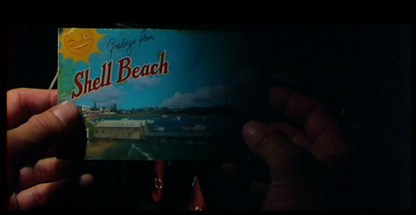Before Their Time: Dark City
By Daniel MacDonald
September 3, 2009
BoxOfficeProphets.com

Dark City's protagonist, John Murdoch (played with frantic zest by Rufus Sewell), is suffering from amnesia, and is being pursued for a muder that he may or may not have been involved with by both a police inspector (William Hurt) and a mysterious cadre of men known as the Strangers, who possess telekinetic powers and are altogether unpleasant. Murdoch struggles to regain his memory with the help of his lounge singing wife (Jennifer Connelly), and ultimately becomes obsessed with finding what he learns was his childhood home, Shell Beach. He's sure that if he can reach that elusive place - a location that seems to evade him at every turn - his memories will return, and he'll once again know what kind of man he is. I won't say more for the risk of spoiling the story's significant and satisfying mysteries, but along with the great plot, Dark City is worth checking out for Kiefer Sutherland's uncharacteristically quirky performance.
The mystery element is of vital importance to Dark City's structure. As written by Proyas, David Goyer (The Dark Knight) and Lem Dobbs (The Limey), much of the story is told from the subjective viewpoint of John Murdoch. Even scenes in which Murdoch doesn't appear are designed not to give too much away, and rarely reveal anything to us that Murdoch doesn't already know. We're not intended to be ahead of our hero, which is why the director's cut released last year is so, so much better. Gone is the heinously expositional voiceover that ruins the third act twist in the first ten minutes, along with a number of other elements that we were intended to learn about much later, leaving behind a tightly structured head scratcher of a movie that, while it sometimes confuses the hell out of the viewer, nonetheless retains enough of a hook that we want to keep on watching. It's remarkable to me that Dark City became a cult favorite prior to the new version's release, really, because the theatrical version seems so compromised in comparison.
What isn't flawed, however, is the absolutely astounding production design and cinematography. Taking cues from Blade Runner's post-apocalyptic urban landscape, Fritz Lang's Metropolis, and the high-contrast, low color patina of many Tim Burton works, Dark City delivers dark but compelling images in a cumulative effort to set the tone. There's a lot of flair on display, but it's never flashy or attention grabbing, and the frequent homages to films past are subtle enough to avoid destracting from the narrative. Egyptian-born, Austrailian-raised director Alex Proyas clearly knows his film history, and I hope he returns to the type of thoughtful, deliberately paced filmmaking he delivers with this picture at some point in the future: in recent years, he has had some success with Hollywood blockbusters I, Robot and Knowing, both intelligent, well-made thrillers, yet it's Dark City that seems like his most personally invested picture, and has the strongest, most singular viewpoint.
Made for a modest budget of $27 million, Dark City took in only about $14 million domestically, and about $13 million in foreign sales, breaking even on pure production costs but probably coming in at a loss overall once marketing is factored in. In contrast, Proyas' previous (and first) film, The Crow, earned nearly $51 million in North America alone; Dark City's lackluster performance must've taken some of the bloom off the rose of his budding career. Perhaps that served as the impetus for a turn toward more commercial fare. Still, Ebert wasn't the only critic smitten with Proyas' work: the film scored 77% fresh at RottenTomatoes.com.
DVD is where Dark City really came into its own, premiering early in the format's life cycle and featuring one of the most stacked special features set available at the time: two audio commentaries, including one by Roger Ebert, film comparisons to Metropolis, information on set design, and a contribution from fantasy writer Neil Gaiman. Given the opportunity to unlock Dark City's delights in the comfort of the home, people seemed to give the movie a second chance, and it became more and more appreciated for both its acknowledgement of its forefathers in cinema history and its own boldly original vision. There's a great deal of texture throughout Dark City, and it's a picture that rewards multiple viewings.
Were it released today, would Dark City have done much better? That's a tough question to answer: audiences' appetites for intellectual exercise tend to vary virtually from day to day, and Dark City's not an easy picture to market. There is a simple, straightforward answer to all of the plot's mysteries at its core, yet it takes nearly the full running time to get there. How can that kind of patience be encouraged? Perhaps Dark City is one of those movies destined to be before its time no matter when its time is, a film that is spread virally amongst fans, the elusive cachet of cool that goes along with liking a picture others haven't even heard of driving viewers to seek it out